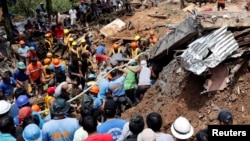Philippine officials are calling for a review of mining activities in the country’s mountains.
The investigation was ordered after two deadly landslides struck hillside communities where mines were operating.
Both landslides came after a powerful storm hit the Philippines on September 15. Officials say Typhoon Mangkhut killed more than 80 people nationwide.
The first landslide was in the northern mining town of Itogon. It happened shortly after the typhoon struck. The Itogon landslide buried about 60 people, most of them miners and their family members.
Philippine officials said the landslide affected an area where a gold mine was operating illegally. Illegal mining can weaken hillsides, increasing the chance of landslides, they said. People living near the gold mine ignored warnings from police and disaster officials to leave the area before the storm hit.
A second landslide struck in the central province of Cebu on September 20. It affected two villages, burying 30 homes. Local officials said more than 20 people were killed. The area was near several mining operations.
The typhoon did not reach Cebu, but caused heavy rain across much of the Philippines.
After the first tragedy, Environmental Secretary Roy Cimatu said the government would begin deploying soldiers and police to six mountain provinces. He said the move was aimed at reviewing the safety of mining activities and ending illegal operations.
Philippine President Rodrigo Duterte also called for investigations into the dangers of mining.
“We have a problem with the mining industry,” Duterte said in a statement on his official website. “It has not contributed anything substantial to the national economy.”
The president added that the mining industry was operating “uncontrolled” and had hurt the economy. “That mining thing has really contributed a lot of heartaches for the Filipino people,” he said.
Antonio Contreras is a political scientist at De La Salle University in the Philippines. He says the government had learned from earlier disasters how to better prepare for powerful storms. This time, he said, officials were “very ready” and took more “systematic” steps to get people out of dangerous areas before the typhoon.
About 150,000 people were already in temporary shelters when Typhoon Mangkhut hit. Officials say this helped to keep the number of deaths low. Five years ago, a powerful typhoon killed 6,200 in the Philippines.
Contreras says most of the criticism after the storm has been directed at the nation’s mining industry. Some people have blamed mining operations for causing openings on hillsides that may have caused the landslides after heavy rains.
Herman Kraft is a political science professor at the University of the Philippines Diliman in Manila. He says he thinks the government should have done a better job enforcing orders for people to leave.
There should be a point “where you don’t give them any choice anymore,” Kraft said.
On the mining issue, Kraft said Duterte and others are seeking an investigation into how mining operations are affecting local communities. “The question that’s being raised now is the extent to which mining companies have actually undermined the land,” he said.
I’m Bryan Lynn.
Ralph Jennings reported this story for VOA News. Bryan Lynn adapted his report for Learning English, with additional material from the Associated Press and other sources. George Grow was the editor.
We want to hear from you. Write to us in the Comments section, and visit our Facebook page.
_____________________________________________________________
Words in This Story
review – n. an investigation or study
contribute – v. give something in order to provide or achieve something together with other people
heartache – n. extreme sadness
extent – n. the size or importance of something
undermine – v. make someone less confident or make something weaker







